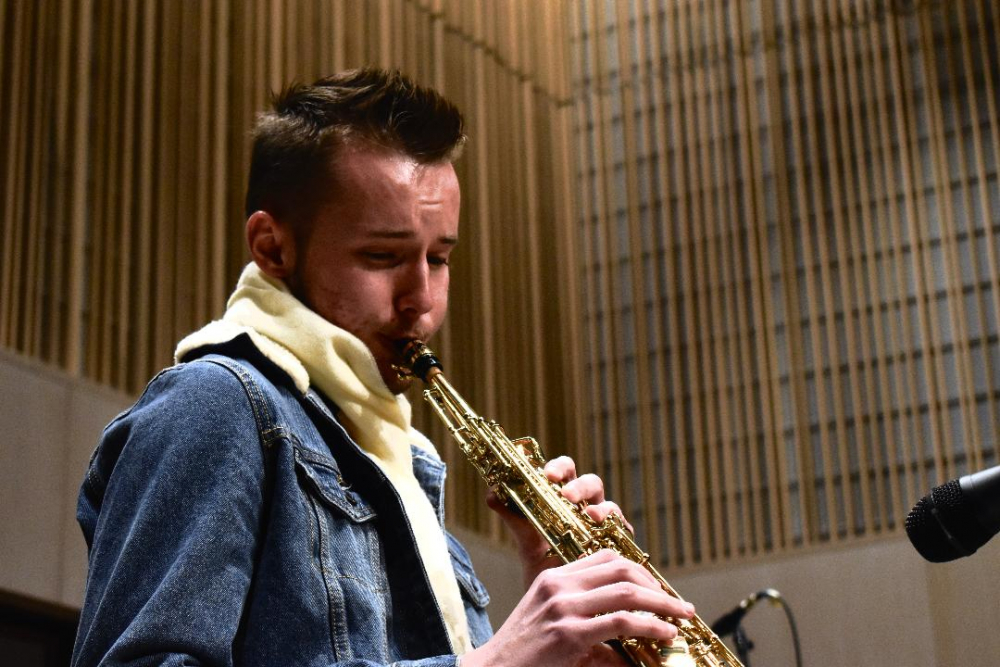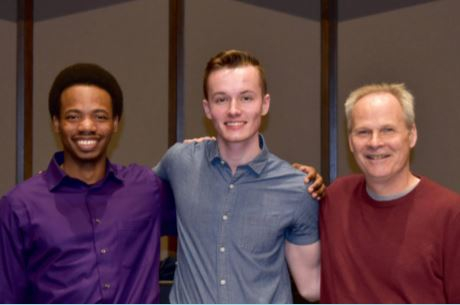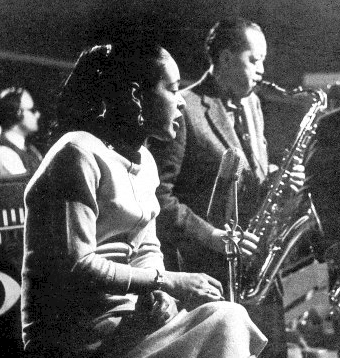
Saxophonist Jason Blythe of the University of Delaware jazz ensemble
The Sumner Hall concert series, African American Legacy and Heritage, continues April 13 with a trio led by tenor saxophonist Jason Blythe. A University of Delaware student, Blythe caught the attention of Tom McHugh, the concert series’ organizer, in a performance at the Mainstay. For the Sumner Hall series, McHugh invited Blythe to recreate the sound of the great Lester Young’s 1946 recordings with a trio including Nat “King” Cole and Buddy Rich.
Blythe was born and raised in Camden, Delaware. In an email April 4, he said that his mother and sister were flutists, and a late cousin played the saxophone in the band in middle school. When his aunt and uncle gave him a Yamaha alto saxophone to learn for school, he said, “I didn’t really think much of it, you know? I didn’t think that that instrument could turn into a future for me. Eventually, I started playing in the jazz band at my middle school. My first real influence was the great Michael Brecker, who absolutely blew my mind every time I heard a recording of him—and still does!” Blythe started playing tenor saxophone in his sophomore year of high school and is now the leader of the sax section of the UD jazz ensemble.
At the university, Blythe is studying with Todd Groves, whom he describes as “extremely experienced, and just scary good at any woodwind instrument you hand him.” As for the music of Lester Young, he said, “I had not really listened to much Lester Young before I heard about this opportunity from Tom McHugh a few months ago,” though he had listened to musicians such as Stan Getz and Greg Fishman whose playing is rooted in Young’s style. He said that listening to the trio album with Cole and Rich “has been a treat for me—I have a much greater appreciation for his playing now. I’m excited to share the music of Lester Young with you!”

The Jason Blythe trio — drummer Isaiah Keith, Blythe, and pianist Tom Palmer
Of his bandmates for the concert, Blythe said, “I’ve known (drummer) Isaiah Keith since I started playing at UD. I’m very glad to know Isaiah, both as a person and as a player. He is without a doubt the most insane drummer I’ve had the pleasure of playing with, and while I find myself trying to keep up with his intellect in an improvised setting, I also know that he’s reliable, keeps the groove, and swings in every context.”
Multi-instrumentalist Tom Palmer, the pianist for the date, is the leader of the UD jazz ensemble and an Assistant Professor of Music. Blythe said, “Every time I hear him play drums, I can’t help but bounce my leg. He knows just what to do and when to do it. He plays piano with just as much taste and appropriateness as his work on drums. I’m very excited to have the opportunity to pay homage to the Lester Young Trio with him.”

Billie Holiday and Lester Young – “Lady Day” and “Pres”
Lester Young (1909-1959) was one of the true giants of jazz, a pioneer whose work inspired the creators of modern jazz in the 1940s and after. A member of the original Count Basie band in the 1930s, he developed a light-footed, supple approach to the tenor saxophone in contrast to the then-dominant full-bodied style of Coleman Hawkins. In the process, he founded a school that continues to this day – notable “disciples” include saxophonists Stan Getz, Zoot Simms, Dexter Gordon, and Gerry Mulligan, but his influence extends to the entire “cool jazz” movement of the 1950s and beyond. While Young was a consummate big band soloist, much of his best work was done with small groups – notably the pickup combos, usually led by Teddy Wilson, that backed Billie Holiday’s early recordings. Young and Holiday remained close for the rest of their too-short lives; he gave her the nickname, “Lady Day,” and she returned the favor by dubbing him “Pres” – short for “President” (of saxophone players).
Pres’s personal life was marked by tragedy. Drafted into the army in 1944, he was not allowed to play his instrument but instead was assigned to regular basic training. His independent attitude made him a target for racist sergeants. He was charged with marijuana possession and court-martialed, spending a traumatic year in detention before a dishonorable discharge. For much of his post-war career, he scuffled to find gigs, while other players imitating his style were far more successful. A sense of his last years can be gathered from the movie “Round Midnight,” in which Dexter Gordon plays an expatriate jazz musician modeled in part on Young.
Despite it all, Pres’s music remained at the highest level. He played on many memorable recordings, notably in the mid-40s with the trio including Cole and Rich to which Blythe’s concert will pay tribute. He was a regular with Norman Granz’s “Jazz at the Philharmonic” concerts, trading solos with such giants as Charlie Parker, Roy Eldridge, Coleman Hawkins, and Oscar Peterson, and he played several reunion concerts with Basie, including the Newport Jazz Festival in 1957. That same year, he made a last appearance with Lady Day on a TV show, “The Sound of Jazz,” playing a touching solo on “Fine and Mellow.” (Check it out on YouTube — and watch Holiday’s reaction as Pres plays.) But almost anything he recorded will reward listening – his unique sense of melody and his consummate swing were unfailing.
Jason Blythe’s recreation of Young’s famous trio offers a fascinating look at the continuing influence of one of the greatest musicians in jazz history on a younger generation that is setting out on its own jazz journey. You can come along for the ride at the Sumner Hall concert, 7 p.m. Saturday, April 13; tickets are $20. Reservations can be made on the Sumner Hall website. No-one who enjoys classic jazz should miss this one!



Write a Letter to the Editor on this Article
We encourage readers to offer their point of view on this article by submitting the following form. Editing is sometimes necessary and is done at the discretion of the editorial staff.